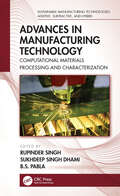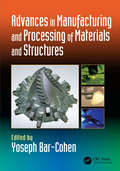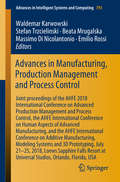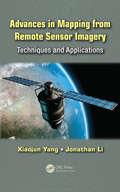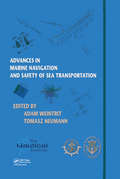- Table View
- List View
Advances in Manufacturing IV: Volume 1 - Mechanical Engineering: Digitalization, Sustainability and Industry Applications (Lecture Notes in Mechanical Engineering)
by Olaf Ciszak Vitalii Ivanov Bartosz Gapiński Jose Mendes MachadoThe book covers timely topics in mechanical engineering, with a special attention to advances in machine design, product assembly, technological aspects of production, mechatronics and production maintenance. Gathering peer-review contributions to the 8th International Scientific-Technical Conference MANUFACTURING 2024, held on May 14-16, 2024, in Poznan, Poland, it reports on cutting-edge research and methods fostering design processes, optimization of industrial processes, such as welding and molding, and machining, with an emphasis on sustainable solutions. All in all, this book offers a timely guide for researchers and professionals in mechanical engineering and manufacturing, yet it is also intended to foster communication and cooperation between universities and industrial partners.
Advances in Manufacturing IV: Volume 2 - Production Engineering: Digitalization, Sustainability and Industry Applications (Lecture Notes in Mechanical Engineering)
by Justyna Trojanowska Ivan Pavlenko Agnieszka Kujawińska Jozef HusarThis book describes cutting-edge research and technologies aimed at increasing the efficiency of production processes and supporting the implementation of Industry 4.0 and Industry 5.0 solutions in production. Gathering peer-review contributions to the 8th International Scientific-Technical Conference MANUFACTURING 2024, held on May 14–16, 2024, in Poznan, Poland, it reports on research on and applications of artificial intelligence and digital technologies to improve the production process. It also presents augmented/virtual and mixed reality tools that can be used or have been tested in the manufacturing industry and for education and training purposes. Last but not least, it highlights cutting-edge solutions for green and sustainable production. Offering a timely, practice-oriented reference guide for both researchers and practitioners in manufacturing, this book is also intended to bridge the gap between university and industry, fostering a closer communication and cooperation between them
Advances in Manufacturing IV: Volume 3 - Quality Engineering: Digitalization, Sustainability and Industry Applications (Lecture Notes in Mechanical Engineering)
by Adam Hamrol Marta Grabowska Marcin HinzThis book covers timely topics in quality engineering, with a special focuses on issues relating to Industry 4.0 and 5.0. Based on peer-reviewed contributions to the 8th International Scientific-Technical Conference MANUFACTURING 2024, held on May 14–16, 2024, in Poznan, Poland, the chapters describe advanced engineering methods for managing quality and risk at different stages of the product lifecycle. They discusses the role of the sustainable development aspect in supply chain, in the context of product and business planning, production, and transportation, and the principles and best practices of circular economy. They also highlight the role of the human factor in Industry 5.0, and discuss educational issues. All in all, this book provides both researchers and practitioners with a timely guide on research in the broad area of quality engineering, covering human and environmental aspects of industrial production, and risk-based management methods.
Advances in Manufacturing IV: Volume 4 - Measurement and Control Systems: Digitalization, Sustainability and Industry Applications (Lecture Notes in Mechanical Engineering)
by Magdalena Diering Michał Wieczorowski Mukund HarugadeThis book gathers timely contributions on metrology and measurement and control systems, across different disciplines and fields of applications. The chapters, which were presented at the 8th International Scientific-Technical Conference, MANUFACTURING 2024, held on May 14-16, 2024, in Poznan, Poland, cover cutting-edge research and best-practices concerning the use of AI-based optical, computed tomographic, coordinate metrology and vision inspection systems to assess manufacturing processes and products. They discuss strategies for automating, and for improving the effectiveness of quality control and measuring processes. All in all, this book provides both researchers and practitioners with a timely guide on cutting-edge measuring and control systems supporting the development of modern manufacturing in the context of digitalization, sustainability and industry applications.
Advances in Manufacturing IV: Volume 5 - Biomedical Engineering: Digitalization, Sustainability and Industry Applications (Lecture Notes in Mechanical Engineering)
by Filip Gorski Michał Rychlik Răzvan Păcurar Joaquín F. Roca GonzálezThe book covers timely topics in digital healthcare and personalized medical products. It delves into the use of digital technologies like image processing, CAD, AI, and 3D printing in healthcare, emphasizing their role in customizing treatment and manufacturing medical products. Based on peer-reviewed contributions to the 8th International International Scientific-Technical Conference (MANUFACTURING 2024) held on May 14-16, 2024, in Poznan, Poland, the chapters reports on achievements from interdisciplinary collaborations between engineers, doctors, and the medical industry. All in all, this book offers a timely guide for researchers and professionals in medical design, manufacturing, and biomedical engineering, and a bridge fostering communication and collaborations between different stakeholders working on enhancing health interventions through technology.
Advances in Manufacturing Processes and Smart Manufacturing Systems: Smart Materials and Manufacturing Systems and Sustainable Management Operations, Volume 1 (Lecture Notes in Networks and Systems #1214)
by Denni Kurniawan Fethma M. NorThis book presents an exploration of contemporary challenges and opportunities in manufacturing and supply chain management, expected to provide insights for academics and industry professionals. This is the first volume of a two-volume proceedings series curated from over 100 submissions from the Global Congress on Manufacturing and Management (GCMM 2023) held in Kuching, Malaysia on December 4–7, 2023. The chapters cover a broad spectrum of industries, including automotive, electronics, food, and energy, with a wide range of topics, from the adoption of new technologies like induction stoves and electric vehicles, to the optimization of production facilities and supply chain resilience.
Advances in Manufacturing Processes and Smart Manufacturing Systems: Smart Materials and Manufacturing Systems and Sustainable Management Operations, Volume 2 (Lecture Notes in Networks and Systems #1215)
by Denni Kurniawan Fethma M. NorThis book emphasizes the increasing role of smart technologies, the exploration of sustainable materials, and the importance of efficient processes across different sectors, offering beneficial insights for academics and industry professionals. This second in a two-part series from the Global Congress on Manufacturing and Management (GCMM 2023) which was held in Kuching, Malaysia, on December 4–7, 2023, presents the use of Internet of Things for the control and monitoring of systems, sustainable and efficient practices, smart systems development, logistics service processes, supplier selection, and optimization of manufacturing processes.
Advances in Manufacturing Processes, Intelligent Methods and Systems in Production Engineering: Progress in Application of Intelligent Methods and Systems in Production Engineering (Lecture Notes in Networks and Systems #335)
by Anna Burduk Andre Batako Xun Chen Kanisius Karyono Ryszard WyczółkowskiThis book forms an excellent basis for the development of intelligent manufacturing system for Industry 4.0, digital and distributed manufacturing, and factories for future. This book of new developments and advancement in intelligent control and optimization system for production engineering serves as a good companion to scholars, manufacturing companies, and RTO to improve the efficiency of production systems.
Advances in Manufacturing Processes: Select Proceedings of ICEMMM 2018 (Lecture Notes in Mechanical Engineering)
by Manoj Gupta K. S. Vijay Sekar A. ArockiarajanThis book comprises selected proceedings of the International Conference on Engineering Materials, Metallurgy and Manufacturing (ICEMMM 2018). It discusses innovative manufacturing processes, such as rapid prototyping, nontraditional machining, advanced computer numerical control (CNC) machining, and advanced metal forming. The book particularly focuses on finite element simulation and optimization, which aid in reducing experimental costs and time. This book is a valuable resource for students, researchers, and professionals alike.
Advances in Manufacturing Processes: Select Proceedings of RAM 2020 (Lecture Notes in Mechanical Engineering)
by Harshit K. Dave Dumitru NedelcuThis book presents the select proceedings of the International Conference on Recent Advances in Manufacturing (RAM 2020). This volume, in particular, provides insights into current research trends and opportunities within the manufacturing processes domain such as conventional and unconventional manufacturing, micro and nano manufacturing, chemical and biochemical manufacturing, and computer-integrated manufacturing (CIM). The topics covered include emerging areas of the fourth industrial revolution such as additive manufacturing, sustainable and energy-efficient manufacturing, smart manufacturing, artificial intelligence in manufacturing application, and computer-integrated manufacturing. This book will be useful for to researchers and practitioners alike.
Advances in Manufacturing Systems: Select Proceedings of RAM 2020 (Lecture Notes in Mechanical Engineering)
by Shailendra Kumar K. P. RajurkarThis book presents the select proceedings of the International Conference on Recent Advances in Manufacturing (RAM 2020). The volume focuses on latest research trends in manufacturing systems such as CAE, CAD/CAM, robotics and automation, reverse engineering, resource planning and simulation, computer-integrated manufacturing (CIM) systems, product life-cycle management, collaborative engineering, process monitoring control and traceability technologies, supply chain management, environment risk analysis, and manufacturing systems of renewable energy devices. The topics covered also include emerging fields of the fourth industrial revolution such cyber physical systems and cyber security, and wireless sensors and sensor networks for manufacturing. This book will be of interest to researchers and practitioners interested in latest developments in the field of manufacturing systems.
Advances in Manufacturing Technology and Management: Proceedings of 6th International Conference on Advanced Production and Industrial Engineering (ICAPIE)—2021 (Lecture Notes in Mechanical Engineering)
by Harish Kumar Ranganath M. Singari Prashant Kumar JainThis book presents the select peer-reviewed proceeding of the International Conference on Advanced Production and Industrial Engineering (ICAPIE) – 2021 held at Delhi Technological University. It covers recent trends in various fields of mechanical engineering. The broad range of topics and issues covered include mechanical system engineering, materials engineering, micro-machining, renewable energy, industrial engineering and additive manufacturing. This book will be useful for students, researchers and professionals working in the area of mechanical and allied engineering discipline.
Advances in Manufacturing Technology: Computational Materials Processing and Characterization (Sustainable Manufacturing Technologies)
by Rupinder SinghThis cross-disciplinary book transcends departmental, institutional, industrial, public, and research organizations and goes beyond global barriers to cover the integration of research, education, and manufacturing in advanced materials processing and characterization, including CAD-CAM, Finite Element Analysis (FEA), and smart manufacturing. Advances in Manufacturing Technology: Computational Materials Processing and Characterization focuses on the design of experiment-based computational models, which involves FEA along with an ergonomics-based design of tooling for both conventional and nonconventional manufacturing processes. It discusses research, work, and recent developments in the field of production manufacturing of any mechanical system. Case studies and solved numerical solutions are included at the end of each chapter for easy reading comprehension. The book is helpful to those working on new developments in the field of product manufacturing. It also acts as a first-hand source of information for academic scholars and commercial manufacturers as they make strategic manufacturing development plans.
Advances in Manufacturing Technology: Select Proceedings of ICAMT 2018 (Lecture Notes in Mechanical Engineering)
by Somashekhar S. Hiremath N. Siva Shanmugam B. R. BapuThis volume comprises select papers presented at the International Conference on Advances in Manufacturing Technology (ICAMT 2018). It includes contributions from different researchers and practitioners working in the field of advanced manufacturing technology. This book covers diverse topics of contemporary manufacturing technology including material processes, machine tools, cutting tools, robotics and automation, manufacturing systems, optimization technologies, 3D scanning and re-engineering, and 3D printing. Computer applications in design, analysis, and simulation tools for solving manufacturing problems at various levels starting from material designs to complex manufacturing systems are also discussed. This book will be useful for students, researchers, and practitioners working in the field of manufacturing technology.
Advances in Manufacturing and Industrial Engineering: Select Proceedings of ICAPIE 2019 (Lecture Notes in Mechanical Engineering)
by Harish Kumar Ranganath M. Singari Kaliyan MathiyazhaganThis book presents selected peer reviewed papers from the International Conference on Advanced Production and Industrial Engineering (ICAPIE 2019). It covers a wide range of topics and latest research in mechanical systems engineering, materials engineering, micro-machining, renewable energy, industrial and production engineering, and additive manufacturing. Given the range of topics discussed, this book will be useful for students and researchers primarily working in mechanical and industrial engineering, and energy technologies.
Advances in Manufacturing and Materials: Select Proceedings of FLUTE 2023 (Lecture Notes in Mechanical Engineering)
by Ravinder Kumar R. K. Tyagi Rakesh Kumar Phanden J. RamkumarThis book presents select proceedings of the 2nd Biennial International Symposium on Fluids and Thermal Engineering (FLUTE 2023). It covers latest research trends in the areas of production engineering and technology such as sustainable manufacturing processes, rapid prototyping, process planning, production scheduling, manufacturing management and automation, metrology, optimization methods for production processes, developments in casting, welding, machining, materials and machine tools. The contents of this book are useful for researchers and professionals working in the areas of manufacturing and materials engineering.
Advances in Manufacturing and Processing of Materials and Structures
by Yoseph Bar-CohenAdvances in Manufacturing and Processing of Materials and Structures cover the latest advances in materials and structures in manufacturing and processing including additive and subtractive processes. It's intended to provide a compiled resource that reviews details of the advances that have been made in recent years in manufacturing and processing of materials and structures. A key development incorporated within this book is 3D printing, which is being used to produce complex parts including composites with odd shape fibers, as well as tissue and body organs. This book has been tailored for engineers, scientists and practitioners in different fields such as aerospace, mechanical engineering, materials science and biomedicine. Biomimetic principles have also been integrated. Features Provides the latest state-of-the art on different manufacturing processes, including a biomimetics viewpoint Offers broad coverage of advances in materials and manufacturing Written by chapter authors who are world-class researchers in their respective fields Provides in-depth presentation of the latest 3D and 4D technologies related to various manufacturing disciplines Provides substantial references in each chapter to enhance further study
Advances in Manufacturing for Aerospace Alloys (Sustainable Aviation)
by Selim GürgenAdvances in Manufacturing for Aerospace Alloys focuses on advanced manufacturing operations and processes related to aerospace alloys. It examines traditional manufacturing methods – often insufficient for shaping aerospace alloys – and the adoption of nonconventional manufacturing techniques for these materials, such as additive manufacturing, laser welding, electrical discharge machining, and vibration assisted machining. The combination of theoretical aspects with practical applications makes this book a critical reference on state-of-the-art techniques and an instructional resource for practicing researchers and engineers, offering straightforward descriptions of manufacturing processes coupled with industry examples and case studies.
Advances in Manufacturing, Automation, Design and Energy Technologies: Proceedings from ICoFT 2021 (Lecture Notes in Mechanical Engineering)
by J. Paulo Davim K. Sankaranarayanasamy N. M. SivaramThis book comprises the proceedings of the 2nd International Conference on Future Technologies in Manufacturing, Automation, Design and Energy 2021. The contents of this book focus on recent technological advances in the field of manufacturing, automation, design and energy. Some of the topics covered include additive manufacturing, renewable energy resources, design automation, process automation and monitoring, etc. This book proves to be a valuable resource for those in academia and industry.
Advances in Manufacturing, Production Management and Process Control: Joint proceedings of the AHFE 2018 International Conference on Advanced Production Management and Process Control, the AHFE International Conference on Human Aspects of Advanced Manufacturing, and the AHFE International Conference on Additive Manufacturing, Modeling Systems and 3D Prototyping, July 21-25, 2018, Loews Sapphire Falls Resort at Universal Studios, Orlando, Florida, USA (Advances in Intelligent Systems and Computing #793)
by Waldemar Karwowski Stefan Trzcielinski Beata Mrugalska Massimo Di Nicolantonio Emilio RossiThis book discusses the latest advances in manufacturing and process control, with a special emphasis on digital manufacturing and intelligent technologies for manufacturing and industrial processes control. The human aspect of the developed technologies and products, their interaction with the users, as well as sustainability issues, are covered in detail. Development of new products using 3D printers, rapid prototyping systems, remote fabrication, and other advanced techniques, is described in detail, highlighting the state-of-the-art and current challenges. Other key topics include digital modeling systems and additive manufacturing, together with their applications in a number of fields, e.g in bioengineering/biomedicine, in the aerospace, maritime and military fields or for archeological and historical purposes, such as preserving structures, but not limited to this. The book is based on three AHFE 2018 affiliated conferences i.e. the AHFE 2018 International Conference on Advanced Production Management and Process Control, the AHFE 2018 International Conference on Human Aspects of Advanced Manufacturing, and the AHFE 2018 International Conference on Additive Manufacturing, Modeling Systems and 3D Prototyping, which were held on July 21-25, 2018, in Orlando, Florida, USA.
Advances in Manufacturing, Production Management and Process Control: Proceedings of the AHFE 2019 International Conference on Human Aspects of Advanced Manufacturing, and the AHFE International Conference on Advanced Production Management and Process Control, July 24-28, 2019, Washington D.C., USA (Advances in Intelligent Systems and Computing #971)
by Waldemar Karwowski Stefan Trzcielinski Beata MrugalskaThis book discusses the latest advances in manufacturing and process control, with a special emphasis on digital manufacturing and intelligent technologies for manufacturing and industrial processes control. The human aspect of the developed technologies and products, their interaction with the users, as well as sustainability issues, are covered in detail. Development of new products using rapid prototyping systems, remote fabrication, and other advanced techniques, is described in detail, highlighting the state-of-the-art and current challenges. Based on both the AHFE 2019 International Conference on Human Aspects of Advanced Manufacturing, and the AHFE 2019 International Conference on Advanced Production Management and Process Control, held on July 24-28, 2019, in Washington D.C., USA, this book also highlight important strategies for managing enterprise of the future.
Advances in Manufacturing, Production Management and Process Control: Proceedings of the AHFE 2020 Virtual Conferences on Human Aspects of Advanced Manufacturing, Advanced Production Management and Process Control, and Additive Manufacturing, Modeling Systems and 3D Prototyping, July 16–20, 2020, USA (Advances in Intelligent Systems and Computing #1216)
by Waldemar Karwowski Stefan Trzcielinski Beata Mrugalska Massimo Di Nicolantonio Emilio RossiThis book discusses the latest advances in the broadly defined field of advanced manufacturing and process control. It reports on cutting-edge strategies for sustainable production and product life cycle management, and on a variety of people-centered issues in the design, operation and management of manufacturing systems and processes. Further, it presents digital modeling systems and additive manufacturing technologies, including advanced applications for different purposes, and discusses in detail the implementation of and challenges imposed by 3D printing technologies. Based on three AHFE 2020 Conferences (the AHFE 2020 Virtual Conference on Human Aspects of Advanced Manufacturing, the AHFE 2020 Virtual Conference on Advanced Production Management and Process Control and the AHFE 2020 Virtual Conference on Additive Manufacturing, Modeling Systems and 3D Prototyping, the book merges ergonomics research, design applications, and up-to-date analyses of various engineering processes. It brings together experimental studies, theoretical methods and best practices, highlights future trends and suggests directions for further technological developments and the improved integration of technologies and humans in the manufacturing industry.
Advances in Manufacturing, Production Management and Process Control: Proceedings of the AHFE 2021 Virtual Conferences on Human Aspects of Advanced Manufacturing, Advanced Production Management and Process Control, and Additive Manufacturing, Modeling Systems and 3D Prototyping, July 25-29, 2021, USA (Lecture Notes in Networks and Systems #274)
by Waldemar Karwowski Stefan Trzcielinski Beata Mrugalska Massimo Di Nicolantonio Emilio RossiThis book provides readers with a timely snapshot of human factors research and methods fostering a better integration of technologies and humans during the whole manufacturing cycle, giving a special emphasis to the quality and safety of the industrial environment for workers, the efficiency of the manufacturing processes itself, the quality of the final product, and its distribution to and use by the customers. It discusses timely issues relating to the automation of the manufacturing processes, and the challenges imposed by the implementation of industry 4.0, additive manufacturing and 3D printing technologies. Contributions cover a range of industrial sectors, such as the automotive, health and constructions ones, highlighting both organizational and engineering solutions fostering sustainability, globalization, customization, workers’ well-being and consumers’ satisfaction, among other issues. Based on the AHFE 2021 Conferences on Human Aspects of Advanced Manufacturing, Advanced Production Management and Process Control, and Additive Manufacturing, Modeling Systems and 3D Prototyping, held virtually on 25–29 July, 2021, from USA, this book, which merges ergonomic research and technical know-how in the field of manufacturing and product design, addresses a wide range of engineers, designers and professionals, dealing with the integration of technologies and humans in the factories of the future.
Advances in Mapping from Remote Sensor Imagery: Techniques and Applications
by Xiaojun Yang Jonathan LiAdvances in Mapping from Remote Sensor Imagery: Techniques and Applications reviews some of the latest developments in remote sensing and information extraction techniques applicable to topographic and thematic mapping. Providing an interdisciplinary perspective, leading experts from around the world have contributed chapters examining state-of-the
Advances in Marine Navigation and Safety of Sea Transportation: Advances In Marine Navigation
by Adam Weintrit Tomasz NeumannThis volume contains a selection of papers presented at the 13th International Conference on Marina Navigation and Safety of Sea Transport and is addressed to scientists and professionals in order to share their expert knowledge, experience and research results concerning all aspects of navigation, safety of navigation and sea transportation. The Thirteen Edition of the most innovative World conference on maritime transport research is designed to find solutions to challenges in waterborne transport, navigation and shipping, mobility of people and goods with respect to energy, infrastructure, environment, safety and security as well as to economic issues.












